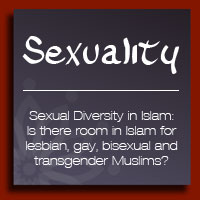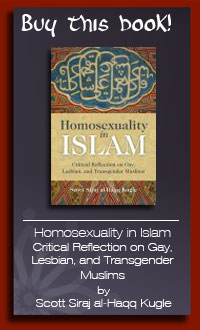





Notes and Definitions of Key Terms
Page: 1 | 2 | 3 | Notes 1 | Notes 2 | Notes 3 | Notes 4
The pronunciation key is intended to give English-speaking readers a close approximation of the word in Arabic. It can not provide a perfect equivalent, however, because some Arabic sounds do not exist in English.
Page: 1 | 2 | 3 | Notes 1 | Notes 2 | Notes 3 | Notes 4
The pronunciation key is intended to give English-speaking readers a close approximation of the word in Arabic. It can not provide a perfect equivalent, however, because some Arabic sounds do not exist in English.
SEX AND RELATED TERMS
Sex
Sex has several meanings.
•Sex refers to any kind of sexual activity, such as vaginal, oral, anal or manual sex. It can include sexual activity between people of the same gender or people of different genders.
•Sex can refer to someone's biological sex—in other words, whether a person is "male," "female" or "intersex."
•Sex is often used interchangeably with gender, in which case it refers to whether someone is a "man" or "woman."
Sexuality
Sexuality has to do with feelings of desire and the way a person relates to other people, as well as actual sex acts.
Lust
Sometimes people refer to any kind of desire or want as "lust." According to Merriam Webster's dictionary, though, "lust" means an "intense or unbridled sexual desire." So "lust" isn't just any desire—it's more like desire that is out of control.
Rape
Rape refers to sex that occurs by force or by threat of injury. Rape may include any kind of sex, such as vaginal, anal, oral or manual (by hand). It can occur between members of different genders (such as men raping women) or between members of the same gender (such as men raping men or women raping women). Both victims and perpetrators of rape may be of any gender (women or men). Victims and perpetrators may be cisgender (in other words, they may identify as the gender they were assigned at birth) or transgender (in other words, they may identify as a gender different from the one they were assigned at birth).
--------------------------------------------------------------------------------
GENDER AND RELATED TERMS
Gender
Gender usually refers to a person's identity as a "man" or "woman." Gender also may include identity as something different, such as "genderqueer" or "third gender."
Cisgender
Cisgender is an adjective that refers to people who identify with their biological sex at birth or the gender they were assigned. Most people are cisgender. Cisgender is the opposite of transgender.
Cisgender people may be straight, bisexual, gay or lesbian.
Intersex
Intersex is an adjective that refers to people who are born with physical traits (such as genitals) or chromosomes that are difficult to identify as clearly male or female. It is estimated that intersex conditions occur in around 1% of births. Usually, intersex children are assigned to one gender ("boy" or "girl") shortly after birth. If an intersex person decides that the gender he or she was assigned at birth was wrong or that the genders "boy" and "girl" do not reflect who they are, they may also identify as transgender. The outdated term for intersex is hermaphrodite. This term is considered inaccurate because it means "having both sexes," which is not necessarily true. There are at least 16 different intersex conditions, some of which are not physically visible and can only be determined by looking at the person's chromosomes.
Some intersex children are subjected to surgery to bring their physical traits closer to what is typical for their assigned gender. However, most of these surgeries are medically unnecessary and often irreversible. They do not take into account how the child will identify their gender when they are older. At this time, surgery of this kind is controversial in many places, including the United States.
Intersex people may be straight, bisexual, gay or lesbian.
Mukhanath
The word mukhanath was used during the Prophet Muhammad's lifetime for males who were seen as "acting like women." They may have been males who did not see themselves as men, in which case they would be considered transgender today. They also may have been men whose behavior, appearance or sexuality made them seem different from other men and more like women. They may have been what people would consider gay, today. It is problematic to try to apply today's labels to people from a different time, though. A mukhanath's understanding of his sexuality or gender may have been different from how people understand those things today.
Transgender
Transgender is an adjective that refers to people who do not identify with their biological sex at birth or the gender they were assigned—in other words, they are not the gender everyone assumed they were when they were born. The word transgender is often used as an "umbrella" term to include people who identify with the opposite gender—for example, a person assigned the gender girl or woman at birth but identifies as a man, or vice versa—as well as people who feel that neither "girl/woman," nor "boy/man" is the right label for them. Transgender people usually dress, act and prefer to be called by the gender with which they identify. For example, a person who was born male but identifies as a woman usually will prefer to be called by a female name, referred to as "she," and will dress and act like a woman.
Transgender people may be straight, bisexual, gay or lesbian.
--------------------------------------------------------------------------------
SEXUAL ORIENTATION AND RELATED TERMS
Sexual Orientation
Sexual orientation refers to a pattern of enduring emotional, romantic, or sexual attraction to other people. In other words, sexual orientation describes who a person is attracted to. Various labels describing sexual orientation include lesbian, bisexual, gay, and straight.
Asexual
A person who does not experience sexual attraction.
Bisexual
The word bisexual refers to a person who is sexually attracted to people of the same gender and other genders, or towards people regardless of gender. It may be used as an adjective or a noun.
Sex
Sex has several meanings.
•Sex refers to any kind of sexual activity, such as vaginal, oral, anal or manual sex. It can include sexual activity between people of the same gender or people of different genders.
•Sex can refer to someone's biological sex—in other words, whether a person is "male," "female" or "intersex."
•Sex is often used interchangeably with gender, in which case it refers to whether someone is a "man" or "woman."
Sexuality
Sexuality has to do with feelings of desire and the way a person relates to other people, as well as actual sex acts.
Lust
Sometimes people refer to any kind of desire or want as "lust." According to Merriam Webster's dictionary, though, "lust" means an "intense or unbridled sexual desire." So "lust" isn't just any desire—it's more like desire that is out of control.
Rape
Rape refers to sex that occurs by force or by threat of injury. Rape may include any kind of sex, such as vaginal, anal, oral or manual (by hand). It can occur between members of different genders (such as men raping women) or between members of the same gender (such as men raping men or women raping women). Both victims and perpetrators of rape may be of any gender (women or men). Victims and perpetrators may be cisgender (in other words, they may identify as the gender they were assigned at birth) or transgender (in other words, they may identify as a gender different from the one they were assigned at birth).
--------------------------------------------------------------------------------
GENDER AND RELATED TERMS
Gender
Gender usually refers to a person's identity as a "man" or "woman." Gender also may include identity as something different, such as "genderqueer" or "third gender."
Cisgender
Cisgender is an adjective that refers to people who identify with their biological sex at birth or the gender they were assigned. Most people are cisgender. Cisgender is the opposite of transgender.
Cisgender people may be straight, bisexual, gay or lesbian.
Intersex
Intersex is an adjective that refers to people who are born with physical traits (such as genitals) or chromosomes that are difficult to identify as clearly male or female. It is estimated that intersex conditions occur in around 1% of births. Usually, intersex children are assigned to one gender ("boy" or "girl") shortly after birth. If an intersex person decides that the gender he or she was assigned at birth was wrong or that the genders "boy" and "girl" do not reflect who they are, they may also identify as transgender. The outdated term for intersex is hermaphrodite. This term is considered inaccurate because it means "having both sexes," which is not necessarily true. There are at least 16 different intersex conditions, some of which are not physically visible and can only be determined by looking at the person's chromosomes.
Some intersex children are subjected to surgery to bring their physical traits closer to what is typical for their assigned gender. However, most of these surgeries are medically unnecessary and often irreversible. They do not take into account how the child will identify their gender when they are older. At this time, surgery of this kind is controversial in many places, including the United States.
Intersex people may be straight, bisexual, gay or lesbian.
Mukhanath
The word mukhanath was used during the Prophet Muhammad's lifetime for males who were seen as "acting like women." They may have been males who did not see themselves as men, in which case they would be considered transgender today. They also may have been men whose behavior, appearance or sexuality made them seem different from other men and more like women. They may have been what people would consider gay, today. It is problematic to try to apply today's labels to people from a different time, though. A mukhanath's understanding of his sexuality or gender may have been different from how people understand those things today.
Transgender
Transgender is an adjective that refers to people who do not identify with their biological sex at birth or the gender they were assigned—in other words, they are not the gender everyone assumed they were when they were born. The word transgender is often used as an "umbrella" term to include people who identify with the opposite gender—for example, a person assigned the gender girl or woman at birth but identifies as a man, or vice versa—as well as people who feel that neither "girl/woman," nor "boy/man" is the right label for them. Transgender people usually dress, act and prefer to be called by the gender with which they identify. For example, a person who was born male but identifies as a woman usually will prefer to be called by a female name, referred to as "she," and will dress and act like a woman.
Transgender people may be straight, bisexual, gay or lesbian.
--------------------------------------------------------------------------------
SEXUAL ORIENTATION AND RELATED TERMS
Sexual Orientation
Sexual orientation refers to a pattern of enduring emotional, romantic, or sexual attraction to other people. In other words, sexual orientation describes who a person is attracted to. Various labels describing sexual orientation include lesbian, bisexual, gay, and straight.
Asexual
A person who does not experience sexual attraction.
Bisexual
The word bisexual refers to a person who is sexually attracted to people of the same gender and other genders, or towards people regardless of gender. It may be used as an adjective or a noun.
Heterosexual
Heterosexual is an adjective used to refer to people who are attracted to people of the opposite gender (whether cisgender or transgender). Heterosexual men are attracted to women. Heterosexual women are attracted to men. It is more common in casual conversation to refer to heterosexual people as "straight."
Homosexuality
Homosexuality refers to desire for sexual intimacy with a member of the same gender (whether cisgender or transgender). Some may experience homosexual desire but not act on it. When someone has sex with a member of the same gender without experiencing any desire to do so—as when someone is raped—that is not an example of homosexuality.
Homosexual
Homosexual is an adjective used to describe a person who is attracted to others of the same gender (whether cisgender or transgender). It applies both to men, who may also be called "gay," and to women, who may also be called "lesbian." In the United States, homosexual is considered a more formal and scientific term for same-sex attraction. It is preferable to use words like "gay" and "lesbian" in casual communication. Some people find the term homosexual offensive because it was originally used to describe attraction to the same sex as a mental illness or disease.
Gay
Gay is usually an adjective that refers to men who are sexually attracted to other men (including cisgender men and transgender men). Sometimes it is also used to refer to any person who is primarily attracted to members of the same gender, though a woman might prefer to be called lesbian. It is a synonym for "homosexual," but is more acceptable in casual conversation. As an adjective, one might use it to say "a gay man." It is sometimes used as a plural noun to refer to gay (and lesbian) people as a group, as in "Gays marched in a parade." It is not correct to use it as a singular noun ("a gay" or "the gay"). That is considered offensive by many people who identify as gay.
Lesbian
Lesbian refers to women who are sexually attracted to other women (including cisgender women and transgender women). It may be used as an adjective or a noun, as in "a lesbian woman wrote the book" or "a lesbian wrote the book."
Straight
Straight is a common adjective used to refer to people who are heterosexual (attracted to people of the opposite gender).
--------------------------------------------------------------------------------
Heterosexual is an adjective used to refer to people who are attracted to people of the opposite gender (whether cisgender or transgender). Heterosexual men are attracted to women. Heterosexual women are attracted to men. It is more common in casual conversation to refer to heterosexual people as "straight."
Homosexuality
Homosexuality refers to desire for sexual intimacy with a member of the same gender (whether cisgender or transgender). Some may experience homosexual desire but not act on it. When someone has sex with a member of the same gender without experiencing any desire to do so—as when someone is raped—that is not an example of homosexuality.
Homosexual
Homosexual is an adjective used to describe a person who is attracted to others of the same gender (whether cisgender or transgender). It applies both to men, who may also be called "gay," and to women, who may also be called "lesbian." In the United States, homosexual is considered a more formal and scientific term for same-sex attraction. It is preferable to use words like "gay" and "lesbian" in casual communication. Some people find the term homosexual offensive because it was originally used to describe attraction to the same sex as a mental illness or disease.
Gay
Gay is usually an adjective that refers to men who are sexually attracted to other men (including cisgender men and transgender men). Sometimes it is also used to refer to any person who is primarily attracted to members of the same gender, though a woman might prefer to be called lesbian. It is a synonym for "homosexual," but is more acceptable in casual conversation. As an adjective, one might use it to say "a gay man." It is sometimes used as a plural noun to refer to gay (and lesbian) people as a group, as in "Gays marched in a parade." It is not correct to use it as a singular noun ("a gay" or "the gay"). That is considered offensive by many people who identify as gay.
Lesbian
Lesbian refers to women who are sexually attracted to other women (including cisgender women and transgender women). It may be used as an adjective or a noun, as in "a lesbian woman wrote the book" or "a lesbian wrote the book."
Straight
Straight is a common adjective used to refer to people who are heterosexual (attracted to people of the opposite gender).
--------------------------------------------------------------------------------
MPV thanks the generous contribution of the Human Rights Campaign for making this adaptation possible.

